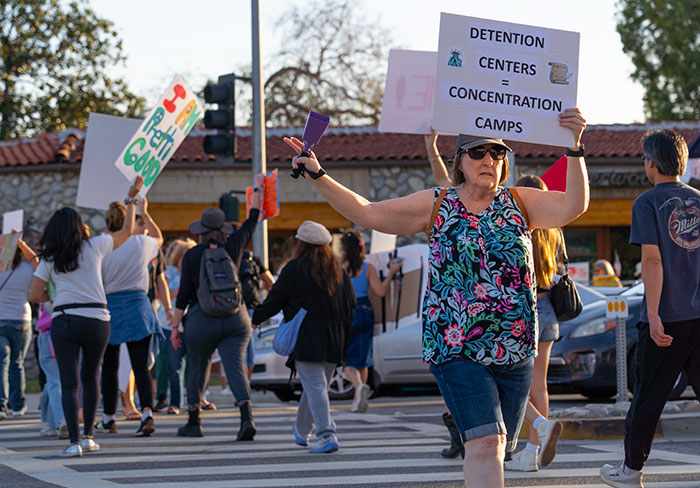Claremont residents question council vote against Prop 57
The Claremont City Council’s decision to formally oppose Proposition 57 was not without its share of criticism.
An online petition has been circulated in the past week admonishing the council for taking a negative stance against the proposition, which would allow early release of low-tier offenders, give judges the final say over whether a juvenile is tried as an adult and expands good behavior and parole statutes. The proposition was put on the ballot by Governor Jerry Brown to chip away at prison overcrowding in the state.
In the unanimous decision against the proposition, the council determined that it would be too risky to let offenders out after the end of their primary sentence. The council mentioned the perceived after-effects by the passing of Prop 47, a previous ballot measure aimed at reducing prison overcrowding that has been pinpointed by police as a reason for the uptick in property crimes in the city.
Nancy Neiman Auerbach, professor of international political economy at Scripps College, called the council’s decision to take a stance on the proposition “kind of unprecedented.”
“Nobody’s asking them to vote on this. They’re actually taking a policy position and I think it does very little good for city,” she said. “It doesn’t make me proud to be a Claremonter.”
Mayor Sam Pedroza disagreed with that assertion it was unprecedented, saying that the council has passed resolutions for or against statewide ballot measures in the past.
According to city spokesperson Bevin Handel, the council has passed resolutions for or against state propositions six times in the past ten years.
The language under Prop 57 includes the notion that non-violent felons would be given the option for parole at the end of their primary sentence, a move that Claremont has decried as risky for local communities.
“Felons who have committed multiple crimes against multiple victims will be eligible for release at the same time as inmates who committed one crime against one victim,” Claremont Police Chief Paul Cooper told the council during the October 25 meeting.
Mr. Pedroza noted that the council is free to take a position on ballot measures that could directly impact the community. That stipulation, he said, is part of the council norms looked over by the city at the beginning of every year.
In this case, the council believes Prop 57 could have that kind of impact on the city, which has suffered through an increase of home and car break-ins in the past year. Mr. Pedroza noted the council had been receiving regular input from the police about crime in the city.
“I think the reason why [the vote] was unanimous was because the council does receive the regular notices from the police department on what’s happening with our nonviolent crimes increase,” Mr. Pedroza said.
Despite law enforcement’s stance on Prop 47, Ms. Auerbach noted there was no direct link between the uptick in crime and the proposition’s passage. There have been a number of studies that have determined no direct link between passing Prop 47 and a higher crime rate, she said, and the council’s decision to take a stance against Prop 57 is based on a “very narrow understanding” of the prison system that leads to nationwide problems such as mass incarceration.
“They basically presented it as an open and shut case, that if you let people out of prison they’re going to have a higher crime rate,” Ms. Auerbach said.
Indeed, a study conducted in March by Mike Males of the Center on Juvenile and Criminal Justice found that it was too early to tell if Prop 47 was directly to blame for a rise in crime rates in California.
“There are no obvious effects associated with Prop 47 that would be expected if the reform measure had produced a consistent impact on crime, and it is too early to conclusively measure the effects of Proposition 47 on crime rates just one year after the law took effect,” Mr. Males wrote in the report.
But Mr. Pedroza—who initially supported Prop 47 in 2014—said the crime hike in the wake of the proposition was too close to ignore.
“It seems too coincidental,” he said.
He issued a challenge to those backing the proposition. “Show me some evidence, show me information that some of those reforms that were supposed to happen under 47 are first of all occurring and second having positive effects,” he said.
The council’s decision has struck a chord within the community, with petitions, phone calls and emails being circulated lambasting the decision to oppose the proposition.
One petition has over 200 signatures as of Thursday morning. Local groups such as the Democratic Club of Claremont and the League of Women Voters are listed in the petition.
The language in the petition is clear—the Claremont City Council should rescind its resolution opposing the measure.
“Given the lack of representation of community members in favor of Proposition 57, to suggest that Prop 57 would compromise the safety of Claremont residents is undemocratic,” the petition read.
Mr. Pedroza stated that the council would have appreciated input from the community before they made their decision, as opposed to afterward.
“The agenda was properly noted,” he said. “How much can the city do to let people know that we’re going to discuss this? I wouldn’t agree that it wasn’t properly noted.”
Ellen Taylor, speaking on behalf of the Claremont chapter of the League of Women Voters, said she disagreed with the council’s decision, but understood why they would do it.
“Their feeling is that we have had a lot of minor crimes on Claremont—maybe it’s these people who are committing these minor crimes, we don’t know,” she said. “But I understand why they came to that conclusion.”
Ms. Auerbach said halfway houses in the city such a Crossroads—which helps formerly incarcerated women to reintegrate into society—are proof that the solution is treatment rather than incarceration.
“This kind of symbolic statement form those who are represent us, it’s upsetting<” she said.
—Matthew Bramlett
news@claremont-courier.com








0 Comments